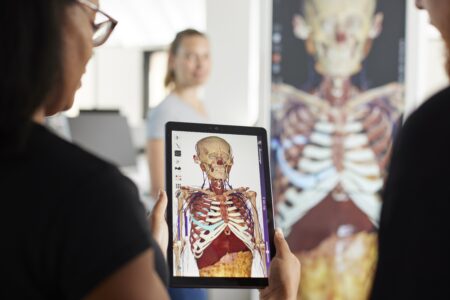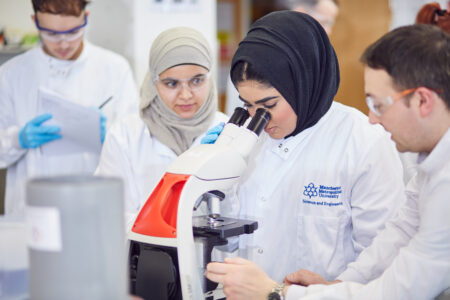Hundreds of millions of people still face hunger today, showing just how urgent it is to find solutions. Life sciences are at the centre of that effort, offering ways to improve nutrition and tackle major health challenges. Advances in fortified foods have helped reduce nutrient deficiencies in millions, while better sanitation and water safety programmes have lowered disease rates worldwide. Scientists are also exploring ways to make food systems more sustainable and diets healthier for future generations.
To make a real-world impact in this field, postgraduate study in life sciences provides the technical expertise, applied research experience and industry-facing training needed to turn discoveries into solutions.
Take Lateefah, for example. She is from Nigeria and is studying an MSc in Food Science and Innovation at Manchester Metropolitan University. “Many health problems start with the food we eat, so I’ve always wanted to help in that area,” she says. “At Manchester Met, I’m able to learn how we can produce new products that are healthier and better for people.”
Manchester Met has been shaping innovation and progress since 1824. At the Department of Life Sciences, postgraduate programmes fuse theory with experience and research to prepare you to do the same.

The MSc Food Science and Innovation focuses on 21st-century food manufacturing, sensory evaluation, regulation, and nutritional biochemistry. Source: Manchester Metropolitan University
Turning food into global solutions
The MSc Food Science and Innovation, starting in September 2025, explores modern food manufacturing and understand how the biochemical properties of food influence taste, texture, nutrition, and health. You will study sensory evaluation, food law, and learn how global trade, regulation, and policy shape food systems. The course will also cover production technologies, functional foods, labelling legislation, and ways to ensure foods are safe and nutritious.
Technical skills are essential in the food industry, and this programme helps you develop them. In dedicated laboratories, you will gain hands-on experience in food production, sensory evaluation, microbiological quality, and chemical and physical analysis. Just ask Lateefah. “In practical sessions, we covered topics like food analysis, where we use different analytical instruments to test food products,” she says. “We also covered food microbiology, where we test for microorganisms in food and their toxicity to humans.”
You will be able to use on-campus food manufacturing facilities, including a 10-booth sensory taste panel suite, development kitchens, and biochemistry and physiology labs. During your studies, you will complete a food development project, creating innovative products from concept to completion. You will consider marketing, sensory analysis, and legal requirements while making your product as well. Past projects have included functional yogurts for elderly consumers and sustainable vegan ice cream made with tiger nuts.
Graduates will be set for careers as food production managers, food technologists, consumer care managers, technical managers, food buyers, or legal compliance officers. “I cannot wait to get into the food industry and practise what I’ve learned to make a positive impact on people who eat what we produce,” Lateefah says.

The MPH Global Public Health offers foundational training in public health, global policy, and epidemiology aligned with UN SDGs. Source: Manchester Metropolitan University
Lead change, one policy at a time
Launching in January 2026, the MPH Global Public Health will provide foundational training in this field and exposure to global health analysis, policies, systems, and practices. It is designed for health professionals and anyone seeking a career in public health or epidemiology.
Modules will cover epidemiology, contemporary issues, policy, power, and leadership from a global perspective. Regional and international examples and data will focus on the seven WHO health-related SDG thematic areas. Critical examinations of topics such as disease prevention, health promotion, and the cultural and historical factors shaping public health policies and practices will set you up for your dissertation. This can focus on areas that match your career goals, systematic or narrative literature reviews, or secondary data analysis.
Learn more about the Department of Life Sciences.
Follow Manchester Metropolitan University on Facebook, Instagram, X, YouTube, and LinkedIn.













